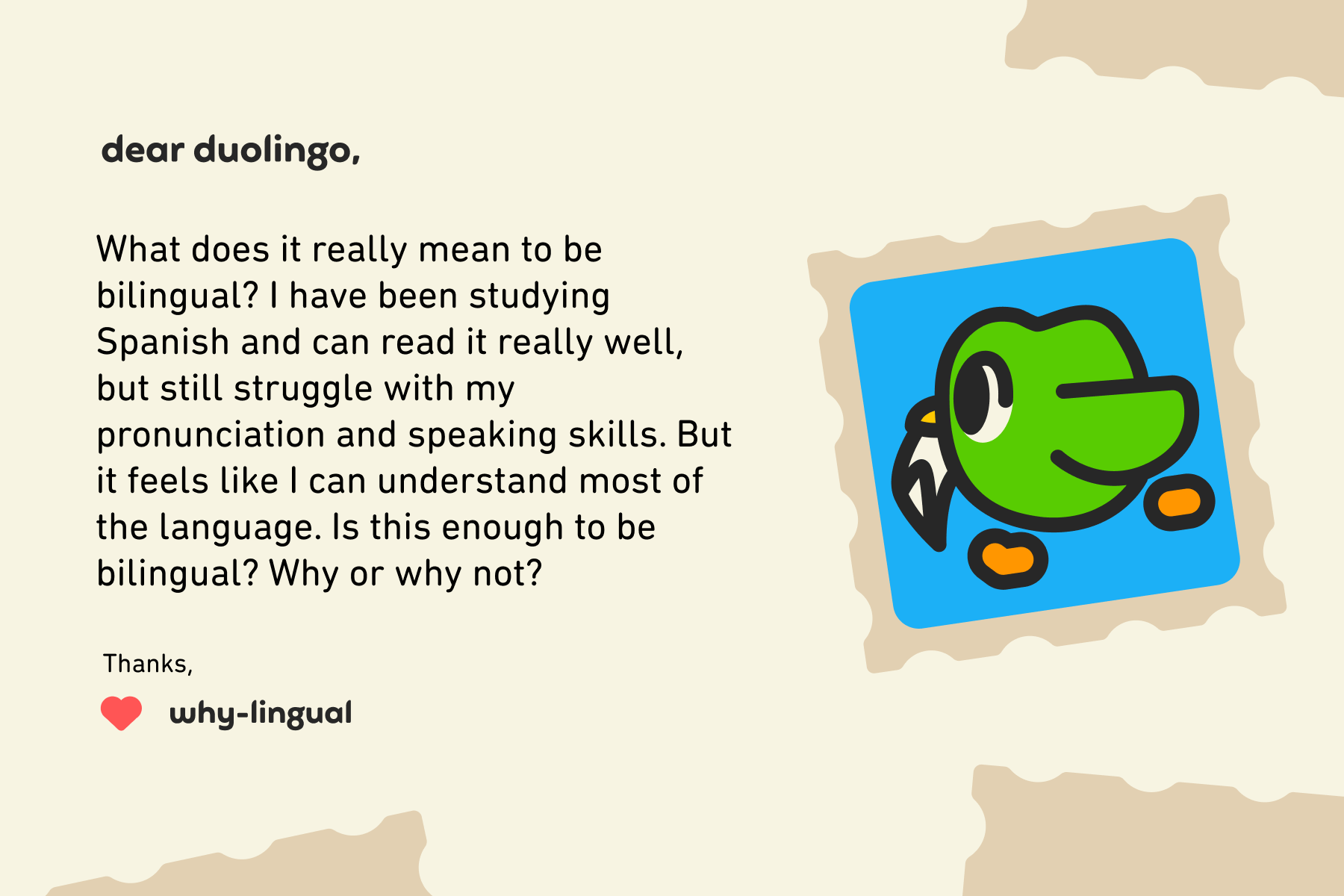Welcome to another week of Dear Duolingo, an advice column just for language learners. Catch up on past installments here.
Hey everyone! We’re back this week to answer your questions about languages and language learning 🙌 This week we have a question that involves every single Duolingo learner and Dear Duolingo reader, so let's get to it.
This week’s question:

This is such a good question: It can be easy to overlook how amazingly complex bilingualism is, and the multiple language communities that bilinguals navigate! There are actually many kinds of bilinguals, and even many ways of defining bilingualism, depending on when you learned each language, how you use your languages, and what stage you are in the process.
What is a bilingual?
There’s not a single definition of what it takes to count as “bilingual”! That’s because when you break down a language into different skills (reading, writing, speaking, listening) and knowledge (vocabulary, grammar, pronunciation, conversation rules), people are inevitably stronger in some areas than others. That’s true even for highly-proficient, life-long bilinguals! As a result, there are many ways to quantify bilingualism.
Generally, a bilingual is someone who uses 2 languages and multilingual is someone who uses 2 or more languages. There’s also evidence that your brain treats multiple dialects as though they are distinct languages—because the line between different dialects and different languages isn’t always clear!
Since there are so many ways to learn languages, and so much to learn, there are many kinds of bilinguals. Here are just a few ways of describing the huge range of bilingual experiences.
Simultaneous bilinguals: 2 languages since birth
One way to think about bilingualism is to think about *when* a person learned the language. If you’ve learned multiple languages since birth, you can be considered a simultaneous bilingual. Some simultaneous bilinguals are exposed to a different language from each parent, and for others there may be another person at home, like a grandparent, who uses a particular language with them.
Learning 2 languages from birth may not mean the person continues to use both languages consistently throughout their life, or even just throughout their childhood. But this exposure to 2 languages at once, right from the start, creates a special task for your baby brain!
Sequential bilinguals: 1 language after another
On the other hand, if you learned one language first and then another, you are a sequential bilingual. This could happen because they use one language at home and another in the community or at school, and it can also happen when people move to new communities, go to an immersion school, or otherwise get exposed to a new language.
For sequential bilinguals, the first language may start stronger than the second language, but that doesn’t mean that will be the case forever! The “volume” of your languages in your brain can change over time, so the language you learn “first” may not always be the one you are most comfortable using!
Receptive bilinguals: understand multiple languages
Receptive bilinguals are people who understand multiple languages but may not be comfortable producing multiple languages. That’s because we can divide language skills into receptive skills (reading and listening skills) and productive skills (speaking and writing). Receptive bilinguals might be able to understand a language when it’s spoken to them, like by parents and grandparents, but may not be confident about responding in that language. It’s very common and totally normal to be stronger in some language skills than others!
As receptive bilinguals know, language learning is about more than just being exposed to the language. Using a language is like developing a muscle, and if you only have the opportunity to flex certain muscles (like your listening muscle), those are the muscles that you develop! Many bilinguals grow up in situations where it’s hard to find opportunities to use one of their languages, or they may experience prejudice or shame for using a language different from what’s common in the community. The result can be strong receptive language skills.
Heritage bilinguals: home language and community language
If a bilingual grows up using a particular language at home with their family and another outside the home in the larger community, they are a heritage speaker or heritage bilingual: One of their languages represents their family heritage.
Some families use a home language different from the community language because they themselves grew up using the home language, maybe in another community or country, while in some parts of the world, having a different home language from the community language has been the norm for centuries… or longer!
Bimodal bilinguals: signed and spoken languages
Bilinguals who use a spoken language and a sign language are called bimodal bilinguals because their languages are in different modes (one signed and one spoken). While bilinguals in the other categories share a lot of overlap, there is one amazing skill that bimodal bilinguals have all to themselves: They can produce both languages at once, signing one while speaking the other. Amazing!
Emergent bilinguals: That’s you!
If you’re still building up your proficiency in a new language, and you don’t fall into one of the categories above, you might be an emergent bilingual: a bilingual-to-be! This is someone (like you, perhaps?) who is on the road to becoming a successful user of multiple languages.
Beefing up all those language skills across all the different things you need to know (from vocab to verb tenses) takes a really long time, but emergent bilinguals achieve lots of important short-term goals on their way to climbing through proficiency levels. There’s no established measure for deciding whether someone “knows” a language—it’s not as easy as checking a box!—so when an emergent bilingual “graduates” to another category is mostly subjective.
Multiple ways to be multilingual!
Bilingualism is a wide range of behaviors and proficiencies, and each person’s situation is a unique combination of communities, identities, families and caregivers, schools, and a life of communication! There are many more kinds of multicultural, multilingual situations than those listed in one short post… but now you can see the amazing complexities and factors that support bilingualism!
For more answers to your language, learning, and bilingualism, get in touch with us by emailing dearduolingo@duolingo.com.

